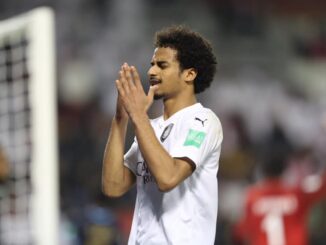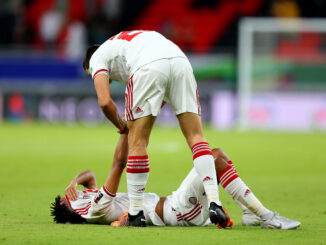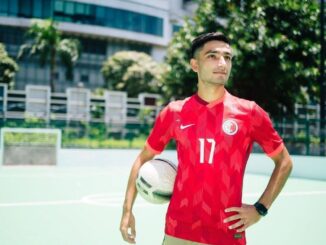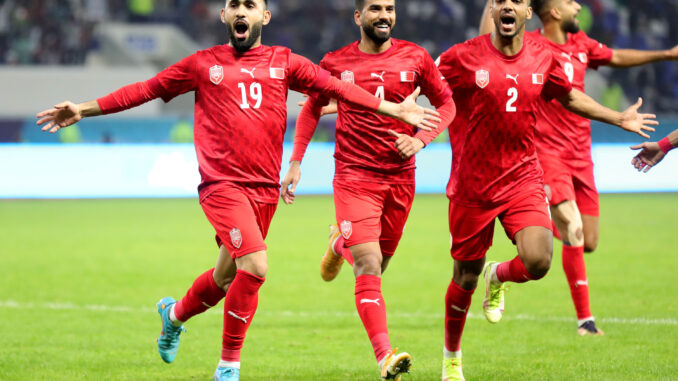
The opening week of the 25th Gulf Cup has sure lived up to its billing.
From the return of sold-out Iraqi stadiums to the widespread good feeling from those visiting the tournament in Basra, the organisation has already been heralded as a critical step forward for football in Iraq and the wider region.
On the pitch, it hasn’t let us down either. We’ve seen heroics from the hosts, a revitalised Yemen side find some form, a plummeting UAE lose theirs, not to mention a torrential downpour that dented the favourites’ hopes of even getting out the group.
Yet amidst the headlines, somewhat in the background, the reigning Gulf Cup champions continue to grow into the tournament as the last team with a 100% record so far.
While few tipped Bahrain to retain their title in Iraq heading into the tournament, their rise over the last four years, testament to their steady and patient decision making, has seen this small Gulf state start to gain the attention it truly deserves.
While success may not materialise in the coming week’s knockout phase, others will start to look further afield. What is there to come from this side, with an Asian Cup and an expanded shot at World Cup qualification heading towards them on the horizon?
The rise and fall of Bahrain’s golden generation
Bahrain football has long been a diminutive underdog with ambitions of stature, way larger than their modest surroundings, even in Gulf terms. A state, half the size of even Qatar, having not benefitted from the mass migration it’s Gulf neighbours have experienced over the last decade; the raw materials in which to build a sustainable, if not successful footballing culture have been difficult to come by.
Yet with that, they were able to construct a golden generation of talent that very nearly clinched World Cup qualification for South Africa in 2010, but for a solitary goal away in Wellington that saw New Zealand progress to the tournament in their place.
That near miss was the culmination of a period of relative success continentally, challenging to the latter stages of World Cup qualification regularly, even making it all the way to the semi-finals of the Asian Cup in 2004, thanks the heroics of golden boot winning A’ala Hubail and star midfielder Talal Yousef.
These brief moments at the pinnacle of Asian football have since waned over the subsequent decades; whilst now being regular qualifiers for the continental showpiece, making it to the knockout stages has often been their glass ceiling.
The solution, as had been adopted by most aspirational nations at that time, seemed to involve crudely throwing money at the problem, without any real thought of the consequence behind their decisions.
Big name coaches came and went; Englishman Peter Taylor and Argentine coach Gabriel Calderon tried and failed, attempting to bring their own approach, through nationalised foreign stars and often disjointed and ageing squads that rarely made a truly telling and long lasting impact.
Ahead of the Road to Russia, a staging post for which the Bahraini FA had high hopes , the appointment of former Argentina coach Sergio Batista became the last roll of the dice.
Instead of competing in the latter rounds as they had hoped, Bahrain failed to get past the initial hurdle; embarrassingly losing out in the second round of qualifying, finishing not only behind what were seen as a credible continental contender Uzbekistan, but developing nations such as North Korea, Philippines and Yemen.
Asian football was changing, it needed Bahrain to move with it, or risk being left behind.
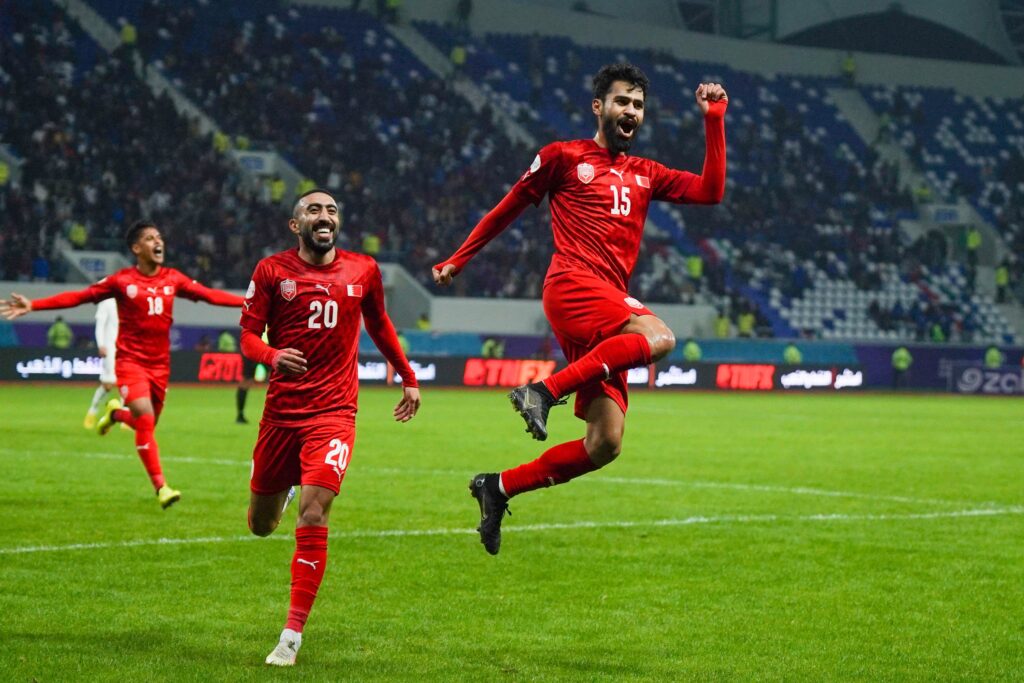
The Great Reset
That defining moment came in the most unassuming of forms. Rather than another high earning, big name coach, Bahrain opted to choose a little known, development specialist Miroslav Soukup; maybe cynically the cheaper option at the time, but with a longer remit to do the unfashionable job of transitioning Bahrain’s style of play into the modern world and crucially from one generation (however golden) to another less advantaged cohort.
An U20 World Cup finalist coach with his homeland Czech Republic, missing out on silverware to the likes of Sergio Aguero and Angel Di Maria, Soukup’s pedigree was in constructing team environments that could exceed the sum of their parts; charged with curtailing the careers of Bahrain’s growingly old sages, and bringing through the upcoming crop.
His tenure, while experiencing numerous mitigations, ended soundly, with their first progression to the knockout stages of the Asian Cup post-2004, with a younger, fresher team with an eye for attacking football. While Soukup was let go following UAE 2019, to bounce around the region (currently residing across town with Yemen at the Gulf Cup) Bahrain had a blueprint to grow.
And grow they did, this time with Portuguese coach Helio Sousa. Another former champion at youth level, Sousa clinched U17 and U19 European championship success in bringing through the likes of Rafael Leao, Diogo Costa and Diogo Dalot, all of whom featured for the senior national team in the World Cup last month.
By luck or design, Sousa took Soukup’s progress to the next level; immediately instilling an attacking approach that broke new ground.
Months after his arrival, Bahrain had won the West Asian Championship, the first in their history. By the end of the calendar year he’d backed that up with a first Gulf Cup as well. The foundations may have been set by a Czech coach, but the fulfilment of potential was being made by his Portuguese successor.
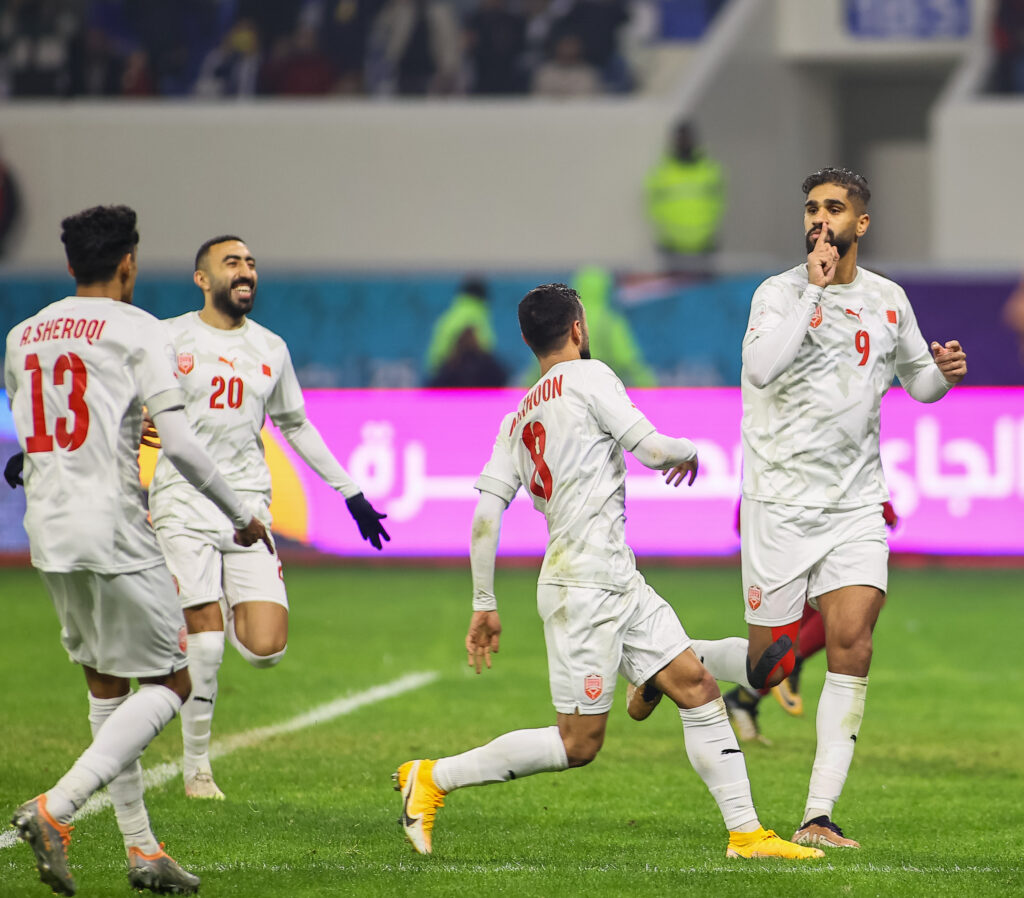
That success spilt over into World Cup qualification; again, like it is today, playing the unassuming role alongside the more prominent headliners. While Iran and Iraq tussled for progression, Bahrain were the antagonist in disrupting their chances. But for a late post-Wilmots revival for Team Melli, Bahrain could well have been contesting for a place in Qatar.
With this rise in prominence, last week’s surprise (on paper) victory over UAE shouldn’t have raised too many eyebrows. In a combative, sturdy display against Qatar on Tuesday, the same feat was achieved, all but certainly securing Bahrain a place into the semi-finals at the Gulf Cup for the third time in succession.
Over the last year Sousa has harnessed a strong, experienced but flexible squad with growing experience and options to mould their play accordingly. Having taken the opportunity to face European, North American and African opposition in the pre-World Cup lull, Bahrain took the opportunity to define their character ahead of another upcoming cycle.
While observers focused on the growing crises of Emirati and Qatari football this last week, maybe we should all start looking at the blossoming challenge from Bahraini football.
The Future
Sousa’s four-year spell has, to date, been effective on the pitch, but it’s also been productive off it in running the rule over the upcoming talent playing domestically and internationally. Crucially talent has been able to gain minutes elsewhere in Asia and Europe of late, as the reputable standard of the national team rises in turn.
The colossal presence of Abdulla Yusuf, now back in Asia with Indonesian club Persija Jakarta, embodies that transformation in standard. Far from the raw young attacking talent brought through under Soukup in 2018, Yusuf’s stint in Europe, most recently with Slavia Prague has developed the striker into the focal point of Sousa’s side.
His evolution from physical goal scorer, to all-round link-up forward has benefitted the current set up with an array of routes to hurt the opposition; through rampaging full back Sayed Isa, the bullish but neat combination play of Jasim Al-Shaikh, or the late penalty box arrivals and finishing of Kamil Al-Aswad.
While this is the current line-up, it isn’t the end of the production line; a tale to be learnt from following their immediate retreat to mediocrity that occurred over a decade ago.
Promising centre back pairing Hamad Al-Shamsan and Ahmed Bughammar have already been tested in big game environments, ready to take over the mantle in the coming years, as are the returning Mohamed Marhoon who like Yusuf now has European experience, alongside the developing and in form striker Hashim Isa.
The rise of younger players starts at home, with an improvement in the domestic game that has also spilt onto the continental club football scene. Following Al-Muharraq’s AFC Cup title victory in 2021, Al-Riffa made it to the Zonal Finals in 2022. With further exposure expected with the newly proposed AFC competitions next year, we can expect more opportunities for Bahraini club to grow against more competitive opposition moving forward.
The more pressing concern, however, will focus on the international stage. With an upcoming Asian Cup in 12 months’ time, Bahrain have arguably their strongest squad since their narrow World Cup miss in 2010.
Yet, the promise of further progression in World Cup qualification is increasingly more appealing. With an increase in allocation slots for 2026, and a number of previously considered favourites (this week’s opponents UAE and Qatar to name two) drifting in the wrong direction towards the new cycle, Bahrain’s name could well become the bolt from the blue to keep an eye on in the coming few years.
Photo: twitter/AGCFF
Listen to The Asian Game Podcast as we discuss Al Nassr’s signing of Cristiano Ronaldo


